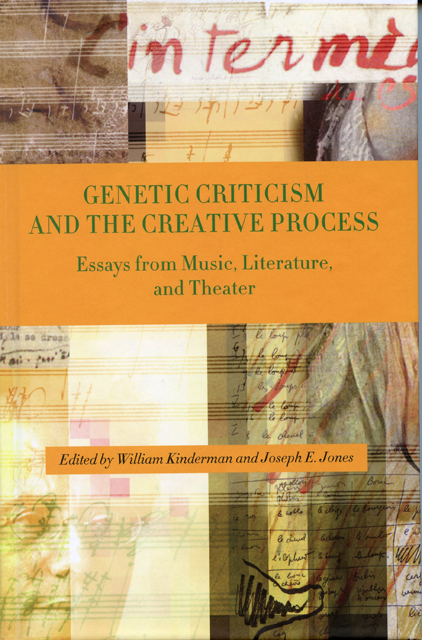Book contents
- Frontmatter
- Contents
- Acknowledgments
- Genetic Criticism and the Creative Process
- 1 Texts, Variants, and Variations: Evolving Contexts in Literature and Theater
- 2 Genetic Processes in Music: From Beethoven to Leroux
- 1 From Varieties of Genetic Experience to Radical Philology
- 2 Variant and Variation: Toward a Freudo-bathmologico-Bakhtino-Goodmanian Genetic Model?
- 3 The Genetic Record of a Voice: Variants in Barthes's Le Plaisir du texte
- 4 Can Genetic Criticism Be Applied to the Performing Arts?
- 5 “The hardy Laurel”: Beckett and Early Film Comedy
- 6 From Melodic Patterns to Themes: The Sketches for the Original Version of Beethoven's “Waldstein” Sonata, Op. 53
- 7 From Conceptual Image to Realization: Some Thoughts on Beethoven's Sketches
- 8 The Process within the Product: Exploratory Transitional Passages in Beethoven's Late Quartet Sketches
- 9 “They Only Give Rise to Misunderstandings”: Mahler's Sketches in Context
- 10 A Study of Richard Strauss's Creative Process: Der Rosenkavalier's “Presentation Scene” and “Schlußduett”
- 11 Genetic Criticism and Cognitive Anthropology: A Reconstruction of Philippe Leroux's Compositional Process for Voi(rex)
- Afterword
- Contributors
- Index
9 - “They Only Give Rise to Misunderstandings”: Mahler's Sketches in Context
Published online by Cambridge University Press: 02 March 2023
- Frontmatter
- Contents
- Acknowledgments
- Genetic Criticism and the Creative Process
- 1 Texts, Variants, and Variations: Evolving Contexts in Literature and Theater
- 2 Genetic Processes in Music: From Beethoven to Leroux
- 1 From Varieties of Genetic Experience to Radical Philology
- 2 Variant and Variation: Toward a Freudo-bathmologico-Bakhtino-Goodmanian Genetic Model?
- 3 The Genetic Record of a Voice: Variants in Barthes's Le Plaisir du texte
- 4 Can Genetic Criticism Be Applied to the Performing Arts?
- 5 “The hardy Laurel”: Beckett and Early Film Comedy
- 6 From Melodic Patterns to Themes: The Sketches for the Original Version of Beethoven's “Waldstein” Sonata, Op. 53
- 7 From Conceptual Image to Realization: Some Thoughts on Beethoven's Sketches
- 8 The Process within the Product: Exploratory Transitional Passages in Beethoven's Late Quartet Sketches
- 9 “They Only Give Rise to Misunderstandings”: Mahler's Sketches in Context
- 10 A Study of Richard Strauss's Creative Process: Der Rosenkavalier's “Presentation Scene” and “Schlußduett”
- 11 Genetic Criticism and Cognitive Anthropology: A Reconstruction of Philippe Leroux's Compositional Process for Voi(rex)
- Afterword
- Contributors
- Index
Summary
Like the innovative art and architecture of his time,1 the music of Gustav Mahler (1860–1911) refl ects new approaches to structure in which detail and effect take their place alongside other, more traditional elements. Yet the creative divergence implicit in such innovation makes it difficult to deal with Mahler's works in precisely the same way as the music of the preceding generation. Rather, the composer's emphases are critical to understanding his intentions, and clues are found not only in Mahler's published correspondence3 and reported conversations, 4 but also emerge vividly in the sketches and drafts that document his compositional process. While Mahler was skeptical about sketch study, per se, it is those very materials that contain clues about important aspects of his own music, offering a perspective that the principles of genetic criticism will be shown to enhance.
Mahler and Sketches
Mahler, who spent much of his career as a conductor, was able to compose only when his responsibilities during the performing seasons eased sufficiently to allow him to concentrate on his own music. It was important for him to approach his compositions systematically, so that he could put the sketches away at some point and return to them later, without having to retrace his steps. The sketches were, for him, private documents, that is, materials he intended for his own use; and despite the fact that he gave some pages to his friends, he did not expect that the manuscripts would necessarily mean anything to others. In fact, in the conversations with Mahler that she took down, Natalie Bauer-Lechner reports that the composer once
… spoke of his sketchbooks and sketchsheets: “For God's sake [see] that they aren't preserved and don't outlive me—I will see to that, and will destroy everything that is unfinished. For they only give rise to misunderstandings. What have they divined from Beethoven’s! That, for instance, he supposedly worked on compositions that are completely different from each other in the same volume. That's nothing! All sorts of things merely occurred to him continuously, which he jotted down and preserved for a later time, and which he then used at the right opportunity.
- Type
- Chapter
- Information
- Genetic Criticism and the Creative ProcessEssays from Music, Literature, and Theater, pp. 151 - 169Publisher: Boydell & BrewerPrint publication year: 2009



